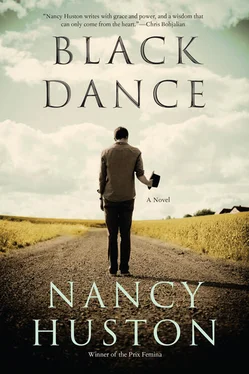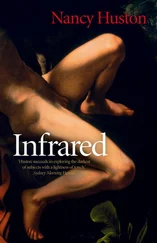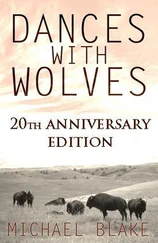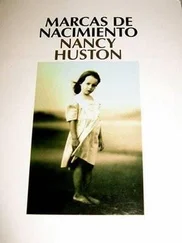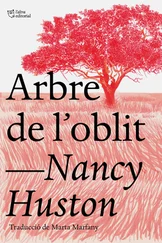“Want a coffee?” the barman asks her.
“Sure. Tanks, Irwin.”
Another man comes to sit on the stool next to her. Tall and youngish, with filthy long black hair and a phony leather cap. He has a lisp.
“You alone, mith?”
“Not anymore!”
“Mind if I thit with you for a while?”
“Make yourself at home.”
Just then the door to the bar opens and Declan walks in, hatless. Though wet, his red hair is longer than when we saw him last; he hasn’t returned to jail. Close-up on his green eyes as, catching sight of Awinita, they light up in a hazel blaze.
We move toward him: Awinita has left her lisper in the lurch.
“Well, if it ain’t Mister Cleaning-Fluid.”
They’re in each other’s arms.
“I missed you, Nita.”
“I missed you, too, baby.”
CUT.
• • • • •
Kid, urchin. Originally simply meant child. Today designates street kids, juvenile delinquents.
Milo, 1956–58
AT FOUR, MILO is a nervous, bristling hedgehog of a child who speaks mostly German with a smattering of French and English, but he especially speaks silence. Silence is the tongue he shares with dogs and cats and trees and flowers, stones and lakes and rivers and skies, turtles and fish, birds and beds, tables and chairs and ceilings and curtains. When you think about it, most things in the world don’t talk and would never do anything to hurt you. Telephones are in between. They look like objects, but in fact they’re nearly people. They talk. His foster mother listened to the telephone talking, then came and told him he’d be leaving. The telephone told her he had to. He doesn’t know why, that’s just the way it is. If you take it as your starting point that everything is unfathomable, and stick to it, you’ll never be disappointed.
Strangers came and took him to a building he’d never seen before. For three days he lived there in a large dorm room with other little children; then other strangers came to fetch him and now he’s living in their house.
He’s not really living there, he’s just pretending. His plan is to string them along for a while, let them believe he’s settled in with them in this house in the suburbs, take a few days to get his bearings, then run away. Though these people call him Milo, he knows he has another name — the one the blond woman gave him after they rode on the merry-go-round together. A cocoon-like name he felt safe inside. For the time being he’s forgotten it, because he was so small when she told it to him — but it’s in his memory somewhere and will come back to him someday, he’s sure of it.
The new family are the Manderses. There’s the father, Jan, handsome and bald with glasses; the mother, Sara, with big, soft breasts and a lilting voice; a boy, ten, Norbert, with spiky blond hair; and a girl, seven, Ana, whose nose is covered in freckles. The parents are Dutch, which sounds like Deutsch , which means German, only they don’t speak German, they speak Dutch, but since they now live in Canada they’ve resolved to speak nothing but English, only sometimes they forget and lapse into Dutch which sounds like Deutsch which means German.
As Norbert can’t help boasting to Milo right off the bat, Jan built the swing set in the backyard with his own two hands. .
(Don’t cry, Astuto. I know, your eyes are as dry as ever but you can’t fool me, I can tell you’re crying, so c’mon, stop it. Don’t forget that snippet of wisdom we gleaned after years of talking and drinking and fucking together — to grow up is to admit that pretty much everything you believed as a child is false. You believed that the sun rose and set, that your soul was immortal, that adults were strong. Wisdom is rough. .)
Jan Manders takes Milo over to the swing set, plunks him into the huge black tire that dangles there, and starts pushing. . Gently at first, until the boy gets used to it, then Want to go a little higher? Milo nods. A little higher? Milo nods, excited. A little higher? Milo nods. Okay, that’s high enough. .
He feels safe, surrounded on all sides by the hard warm ring of black rubber, watching the trees swing back and forth above his head, his whole self given up to sheer, pleasurable sensation.
Sara Manders is rolling out dough for a piecrust. A radio is playing in the background (what year are we? ‘57—yeah, okay, Ella Fitzgerald, Sara could be humming along with Ella). . Milo comes over to watch her and she hoists him onto a chair and helps him help her, tying an apron on him, dusting the rolling pin with flour, then gently guiding his hands on the pin to flatten out the ball of dough.
At bath time she splashes warm water on his back and neck and rubs him gently everywhere with a sudsy washcloth.
At bedtime she reads to the two older children on the living room couch and he creeps up in his pajamas, presses his back to the back of the couch, sticks his thumb in his mouth, closes his eyes and listens. At first, because there are so many words he doesn’t know, it’s just the lilting, the rhythm and melody of her voice that hypnotize him, but after a while the images of the stories start to crystallize and he looks forward to the moment when, picking up where she left off the night before, Sara will thrill them again with her imitations of the sulky donkey and the Queen of Hearts and the parrot that squawks Pieces of eight! Pieces of eight!
“What does that mean, Mama?” Ana asks, and Sara admits she doesn’t know, her English isn’t good enough. . but her imitation of the squawking parrot has them in stitches.
(Was it your grandfather, Milo, who finally told you about pieces of eight? Helping you think it through. Why do we call a quarter two bits, my boy? Because British pounds were divided into eight pieces or bits. . )
When she comes to kiss him good night, Sara runs her fingers through Milo’s hair. Her own children’s hair, like the little that remains of Jan’s, is thin and blond; hers is light brown but Milo’s is thick wavy brown with auburn glints in it. What beautiful hair you have, Milo!
It had never occurred to the boy that something about him could be beautiful.
SWING SWIFTLY THROUGH the cycle of a year.
Autumn: little Ana teaching him the rudiments of reading as she learns them at school.
Winter: the skating rink. Milo inherits Ana’s pink-and-white skates from the year before and is relieved when no one teases him for wearing pink. By afternoon’s end, cheeks red, eyes flashing in silent pride, he skates around the rink all by himself and the Manders family applauds him. At the drink stand where Jan buys them hot chocolate afterward, they get jostled by a noisy group of preteens yelling at one another in French. Though he can’t quite understand the language, it stirs memories in his brain (transient images of neon lights and white-clad arms) that make him want to die.
Spring: Norbert shows him that if you cut an earthworm in two, both halves of it will wiggle on miserably for a while. On the front porch, Jan takes Milo in his arms and points up to the sky — hugely white and alive, vibrating, screaming, with the return of the Canadian geese.
Summer: a barbecue in the backyard. The five of them gobble down spareribs, fingers and lips scarlet with sauce. Point at one another and laugh. Tell jokes. Play pranks. Ana pours a glass of water down her father’s back, provoking a roar. When night falls, they go out hunting for fireflies in the grass.
And then. . at some point during the second fall. . a strange young woman in the kitchen, making dinner. Jan standing by the closed door to his and Sara’s bedroom, talking to a doctor. Another day, a glimpse into that room — Jan emerging from it in tears — reveals a motionless mound barely visible among the bedclothes.
Читать дальше
